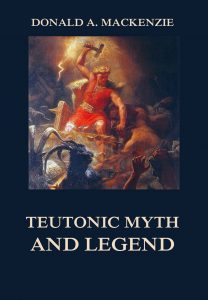Teutonic Myth And Legend – Donald A. Mackenzie
This volume deals with the myths and legends of the Teutonic peoples–Norsemen, Goths, Vandals, Burgundians, Franks, Angles, Saxons, and all the other Germanic tribes whose descendants now occupy England, Northern France, Switzerland, Belgium, Holland, Germany, Denmark, Sweden, Norway and Iceland. The volume might have been called Northern European Myth and Legend. It is the body of folk tales, epics and religious beliefs which all Anglo-Saxons have inherited directly from their ancestors, and find most deeply embedded in every-day words and thoughts such as names for the days of the week, names recalling the gods and goddesses of our forefathers.

Teutonic Myth And Legend
Format: Paperback.
Teutonic Myth And Legend.
ISBN: 9783849675585.
Available at amazon.com and other venues.
Common German deities (from wikipedia.com)
Germanic paganism was polytheistic, revolving around the veneration of various deities. Some deities were worshipped widely across the Germanic lands, albeit under different names. Other deities were simply local to a specific locality, and are mentioned in both Anglo-Saxon and Icelandic texts, in the latter of which they are described as being “the land spirits that live in this land”.
The Ansiwiz similar to the Roman Dii Consentes appear as a limited circle of powerful beings, deities or remote ancestors.
Tīwaz, god of war, Norse Tyr, Old English Tiw, Old High German Ziu, continues Indo-European Dyeus.
Wōdanaz, “lord of poetic/mantic inspiration”, “Germanic Mercury”, Norse Óðinn (Odin), Old English Woden, Old High German Wuotan.
Frijjō, wife of Wodanaz, Norse Frigg. “wife”, c.f. Sanskrit priyā “mistress, wife”. Probably also addressed as Frawjō “lady” (Norse Freya).
Fraujaz. “lord”, c.f. Norse Freyr
Þunaraz, “thunder”, Norse Þórr (Thor), West Germanic Donar, Old English Thunor.
possibly Austrō, goddess of dawn and springtime.
Heavenly bodies may have been deified, including Sowilo the Sun, Mænon the Moon, and perhaps Auziwandilaz the evening star.
(The text of the last section was taken from a Wikipedia entry and is available under the the Creative Commons Attribution-ShareAlike License.)
Publisher’s Note: This book is printed and distributed by Createspace a DBA of On-Demand Publishing LLC and is typically not available anywhere else than in stores owned and operated by Amazon or Createspace.
